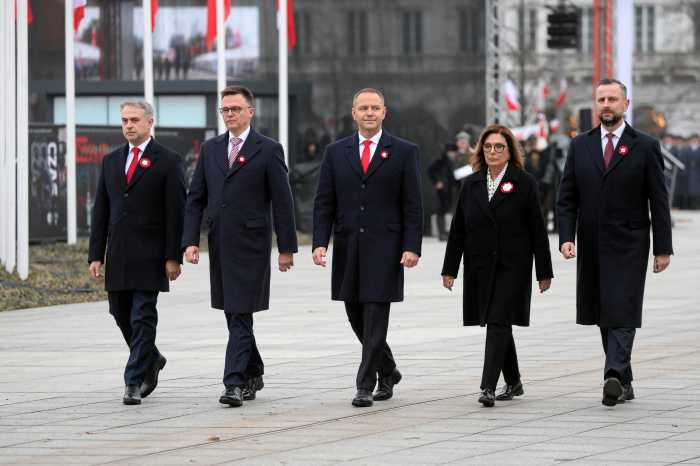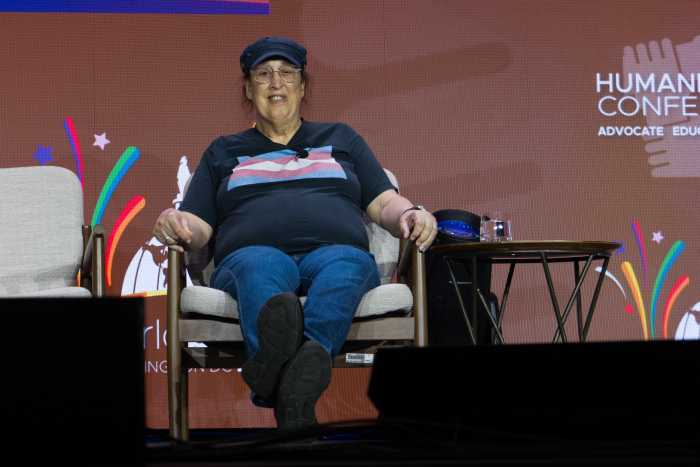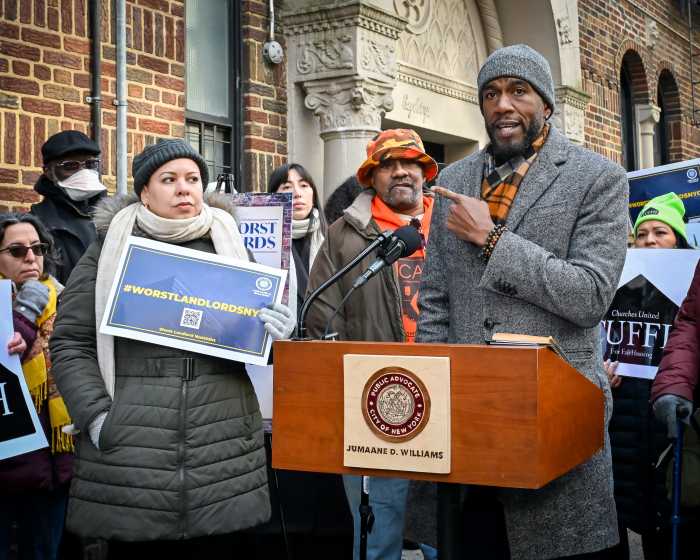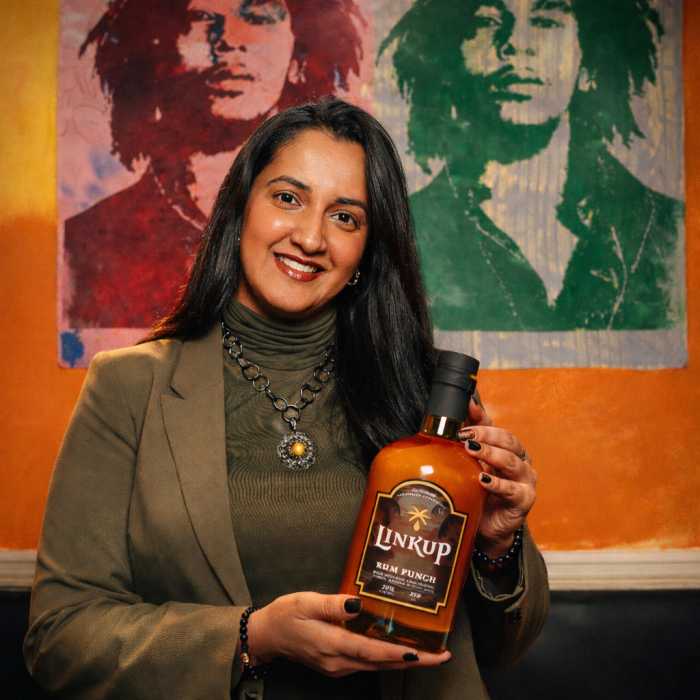BY DOUG IRELAND | The situation of the transgendered in Iran has been the subject of frequent media reports that paint a rosy picture of life for them in the Islamic Republic, and which characterize Tehran – in a recent description in the U.K. daily The Guardian – as “the unlikely sex-change capital of the world.”
Western journalists seem to find it exotic that, in Iran's patriarchal society – in which sexuality and expressions of sexual identity are religiously codified with the force of law, women are restricted to second-class citizenship, and homosexuality is a crime punishable by death – sex reassignment surgery has mushroomed, with the approval of the country's religious authorities.
This came about after Maryam Khatoon Molkara, then a 33-year-old pre-op transman, forced his way into an audience in the early 1980s with the late Ayatollah Ruhollah Khomeini – leader of the 1979 Iranian Revolution and founder of and undisputed authority in the Islamic Republic of Iran. Moved by Molkara's pleas, Khomeini was eventually persuaded to issue a fatwa which declared that sex-change surgery was permitted since it was not mentioned as forbidden in the Koran.
Western journalists present the contemporary Iranian theological discourse on transsexuality that has developed in the ensuing years since Khomeini's fatwa as a curiosity that contradicts the West's prevailing view of Islamic attitudes toward all things sexual.
But Afsaneh Najmabadi, an Iranian who is a professor of Studies of Women, Gender, and Sexuality at Harvard University, in a January 2005 article on Iranian.com wrote that she feels “uneasy” when reading these “celebratory” portrayals of Iran's attitude toward the transgendered.
“Every time I read one of these reports I want to say BUT, BUT, BUT, because there are some scary things going on that have gone almost unnoticed,” she wrote.
Najmabadi, author of “Women with Mustaches and Men without Beards: Gender and Sexual Anxieties of Iranian Modernity” (University of Chicago Press), wrote that Iran's official position on the transgendered has manufactured “a religio-psycho-medicalized discourse on 'unnatural and deviant' [ghayr-i tabi'i and inhirafi] sexualities” that is “deeply troubling because of the explicit framing of transsexuality within a particular mapping of sexuality that simultaneously renders homosexuality, and more generally any sexual and gender non-conformity, as deviant and criminal.”
And while a positive and progressive attitude toward sex-change surgery is liberating for genuinely transgendered people, it can have an enormously deleterious effect when deformed to be used as a supposed “treatment,” or even as punishment, to “normalize” homosexual desire.
Because homosexuality is a capital crime in Iran, and because the regime of President Mahmoud Ahmadinejad has been engaged in a what he has called a “cultural revolution” that involves highly-organized persecutions targeting feminists and homosexuals, the choice presented to Iranian same-sexers is often a stark and unpleasant one, a choice epitomized by the title of a recent documentary by the France 2 public television network's newsmagazine “Envoyé spécial,” which called its half-hour broadcast on the transgendered in Iran “Changer de Sex ou Mourir” – “Change Sex or Die.”
How Iran's official discourse on the transgendered conceals a multitude of evils and ills can be seen in the following, eye-opening interview with Atrian, a 26-year-old male-to-female transsexual activist also known as Sayeh, who fled Iran last year to Turkey.
Atrian was extensively interviewed in Kaysen, Turkey, on April 5 by Arsham Parsi, the 27-year-old executive director of the Iranian Queer Organizati n (or IRQO, the new name adopted by the Persian Gay and Lesbian Organization, or PGLO). Parsi was on a fact-finding trip to meet and help the many LGBT Iranian refugees in Turkey whom the IRQO is assisting.
The interview with Atrian was conducted in Persian, and a transcript was provided exclusively to this reporter, and translated into English for Gay City News by Morteza Dehghani.
Atrian says that there are many people who accept sex-change surgery to escape persecution as homosexuals.
“A significant number of people who get a sex change in Iran are gay, as you cannot state in Iran that you are a man and want to be with another man, even if your appearance is feminine,” Atrian declared.
“There are only a small percentage of people who get a sex-change operation who are actually transgendered. Out of some 100 transsexuals whom I've encountered,” she reported, “only 20 of them were genuinely transgendered, and the rest are gay.”
Atrian explained, “If you are known to be gay, you will be hanged. Therefore, many gays try to plead for societal acceptance by announcing themselves as transgendered. A lot of gays have been brainwashed into believing they are ill. Some believe that if they present themselves as women, they might find a boyfriend more easily.”
It is not often mentioned in Western reports, but to gain approval for sex-reassignment surgery, one must have a certificate signed by the religious authorities declaring that one is “mentally ill.” So, Atrian said, “Many gays believe they will get accepted more easily by society by claiming they are ill [as transgendered].”
Unable to endure the barrage of government persecution, scathing religious opprobrium, and often the hatred of their own families, said Atrian, “Many gays, for many different reasons, become emotional and get the operation. But soon after getting the operation, they'll cry for days at the mistake they have made.”
Atrian recalled her visit to one gay man who had opted for sex-change surgery.
“I was visiting him in the hospital, and he told me, 'If you can, flee Iran.' I asked him why – and as he was crying like a river, he replied: 'I have committed a huge mistake. Why did I want to become a woman? I didn't even become a woman, I've become something deficient, and I would give anything to go back to my previous state.' In another incident, I was at a doctor's office and encountered two transsexuals who were begging the doctor to operate them to go back to their previous state.”
This sort of thing, Atrian related, is quite common.
Atrian described the typical path of what she calls “the many gays who are forced by the society into believing that they are transsexuals. This group is under constant pressure from their parents, telling them that they have been led into deviation from the righteous path. They start analyzing themselves, thinking 'I am a boy, so how can it be that I like other boys? Because this is a sin! I must be a prostitute. I've deviated from the righteous path!'”
So, Atrian recounted, these gays “start contemplating ways to obtain society's acceptance so that it would be okay for them to like other boys. And then they reason: The only way to do that is to attach a label to myself that shows I'm a sick person, because when you are sick, people pity you and say, 'Oh my god, this poor kid! This is the way God has created him, it is a genetic disease!' So, he will be forced to make himself known as a transsexual” who is mentally ill, in order to be treated leniently.
“If you want to prove you're not a homosexual,” Atrian underscored, “you'll be forced to get the sex-change operation. You don't want to be forced to explain why you are attracted to your own sex, and the only way to avoid that is to get the operation.”
And, added Atrian, “A lot of people become drug addicts after the operation because they realize it was a mistake, they become depressed, and often commit suicide because there is no way to undo the operation. But neither the doctors, nor the parents, nor anyone else take responsibility for these tragedies, because no one respects or values transsexuals.”
Atrian said that transsexuals are often raped by the very doctors who are involved in their surgery.
“This is a quite normal occurrence, as normal as saying that your doctor smokes,” she explained. “The doctor knows that the patient is scared and does not have any family support, therefore he will listen to the doctor who claims he wants to help him. But just because they are doctors doesn't mean they are ethical.”
Moreover, Atrian said, “You can't complain about these doctor rape cases to anyone, because the police forces themselves commit the same sort of acts. When I'm already depressed and have problems about my situation, and when this doctor – whom I desperately need and who is in control of my future destiny – forces me to have sex with him, I think to myself, 'How can someone possibly take advantage of another human being in this situation? What such a doctor is doing is similar to a supposedly charitable person who asks a hungry person for sex in exchange for a loaf of bread.'”
In Iran, Atrian said, sex-reassignment surgery has become a lucrative, assembly-line business.
“The doctors performing the operations in Iran are so careless – for them, it is like cutting paper and not flesh,” she explained. “Left and right, on a daily basis, they perform sex-change operations on people without even paying proper attention to each case, just because it's a highly profitable business. Yet they are so proud that they are in a country that allows people to have sex changes. But they perform all these operations improperly, and often incompletely.”
Atrian asserted that, “Out of all the people they operate on, only a few remain healthy. How many of these patients do not become psychotic because of the way they've been treated and mutilated? How many do not commit suicide? How many can live a normal life after their operation? Most of them don't even get the chance of finding a companion – they are shunned as transsexuals, and their past will always haunt them.”
Atrian added that even some psychiatrists “take advantage of the simpleness of their patients. A couple of years ago, one of my friends visited a psychiatrist – and this doctor told him that, if my friend wanted to prove that he had feminine emotions in order to be permitted to get a sex-change operation, my friend had to have sex with him. This is not a common sort of incident with psychiatrists, but it happens from time to time.”
Transsexuals in Iran, Atrian said, are often targeted for beatings in the streets – both by the Basiji (the thuggish para-police used by the regime to enforce its draconian moral codes) and by people pretending to be Basiji. “Anyone who wears Basiji gear and has a motorcycle can beat you and nobody would question them for it, no one would ever check their IDs to make sure they are Basiji forces.” (See this reporter's interview with Mekabiz, a 21-year-old, self-described “transsexual man” who was tortured by police and raped with the complicity of his jailers, in the February 9-15, 2006 issue.)
Atrian related that, “Even though the special forces of the police have no specific orders to arrest transsexuals, they too can arrest you. I myself have been arrested three times, and was disrespected in the most brutal way possible. I remember how four men who looked like Basiji beat me close to death in the middle of the street. They kept slamming their boots on my head so hard that even now, when I think about it, subconsciously my head starts moving to dodge their boots.”
For transsexuals, said Atrian, Iran is “a sick society which made you ill in the first place and is now pointing at you and calling you sick.”
With help from the IRQO, Atrian has obtained a visa to Canada, and is now waiting for a departure date from Turkey, where homophobia and transphobia are rampant and where she has been beaten several times and been threatened with death.
“I hope to get to Canada alive,” she said. “Even if it is only for one year there, I would like to be myself and live without needing to pretend to anyone that I'm a poor and helpless person, live without needing to beg them not to belittle me or attack me. I don't want to feel the need to explain to people that I'm not a dirty and inferior person.”
“My life,” Atrian added, “is not like a cigarette that you can smoke and then throw away, as I will live and suffer in its ashes. I might get to Canada, or I might not. But I will never forget that all my rights were taken away from me in Iran. From now on, I want to build my life.”
For more information on the plight of the Iranian LGBT community, or to make a credit card donation via the secure PayPal system to help refugees from persecution like Atrian, visit the IRQO Web site.
LATE-BREAKING NEWS: The IRQO has just learned of a police raid on a gay party in a private home in Tehran two weeks ago. The police arrested 15 gay men, who were sentenced to be lashed with 60 to 80 strokes each – simply for having been at a gay party. More details to follow as they become available.
DOUG IRELAND can be reached through his blog, DIRELAND.


































